

Here Are The 10 Best Indian Short Films On YouTube From 2016. Ours is a country that's in love with the movies.

Any genre is welcome as long as it entertains us. But this is not limited just to films that we watch in the theatres. With the digital space growing at an exponential rate, Internet has now become our go-to destination for good content. Rabindranath Tagore - Essays - আধুনিক সাহিত্য - বিদ্যাপতির রাধিকা Quora. EDUC 101: Axioms – Medium. So!

Let’s begin. The Chinese Room Argument. 1.
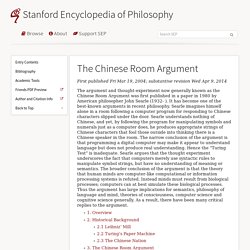
Overview Work in Artificial Intelligence (AI) has produced computer programs that can beat the world chess champion and defeat the best human players on the television quiz show Jeopardy. AI has also produced programs with which one can converse in natural language, including Apple's Siri. Our experience shows that playing chess or Jeopardy, and carrying on a conversation, are activities that require understanding and intelligence. Does computer prowess at challenging games and conversation then show that computers can understand and be intelligent?
Quora. Quora. Quora. Mental Models I Find Repeatedly Useful. Mental Models I Find Repeatedly Useful Around 2003 I came across Charlie Munger’s 1995 speech, The Psychology of Human Misjudgment, which introduced me to how behavioral economics can be applied in business and investing.
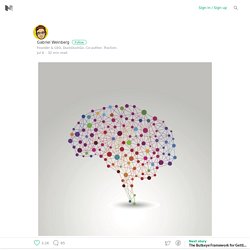
More profoundly, though, it opened my mind to the power of seeking out and applying mental models across a wide array of disciplines. A mental model is just a concept you can use to help try to explain things (e.g. Against Self-Criticism: Adam Phillips on How Our Internal Critics Enslave Us, the Stockholm Syndrome of the Superego, and the Power of Multiple Interpretations. I have thought and continued to think a great deal about the relationship between critical thinking and cynicism — what is the tipping point past which critical thinking, that centerpiece of reason so vital to human progress and intellectual life, stops mobilizing our constructive impulses and topples over into the destructiveness of impotent complaint and embittered resignation, begetting cynicism?
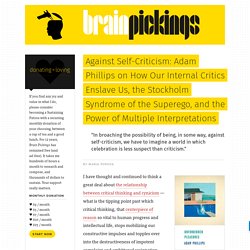
In giving a commencement address on the subject, I found myself contemplating anew this fine but firm line between critical thinking and cynical complaint. To cross it is to exile ourselves from the land of active reason and enter a limbo of resigned inaction. But cross it we do, perhaps nowhere more readily than in our capacity for merciless self-criticism. We tend to go far beyond the self-corrective lucidity necessary for improving our shortcomings, instead berating and belittling ourselves for our foibles with a special kind of masochism. Authority wants to replace the world with itself. 32 Animated Videos by Wireless Philosophy Teach You the Essentials of Critical Thinking.
Do you know someone whose arguments consist of baldly specious reasoning, hopelessly confused categories, archipelagos of logical fallacies buttressed by seawalls of cognitive biases?
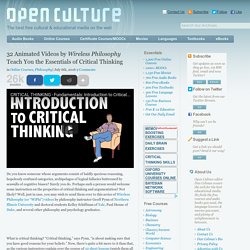
Surely you do. Perhaps such a person would welcome some instruction on the properties of critical thinking and argumentation? Not likely? Reading with intention can change your life — Quartz. A random sampling of the world’s most successful people will show one common trait: a love of reading.
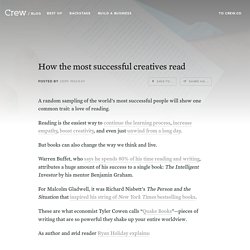
Reading is the easiest way to continue the learning process, increase empathy, boost creativity, and even just unwind from a long day. But books can also change the way we think and live. Warren Buffet, who says he spends 80% of his time reading and writing, attributes a huge amount of his success to a single book: The Intelligent Investor by his mentor Benjamin Graham. For Malcolm Gladwell, it was Richard Nisbett’s The Person and the Situation that inspired his string of New York Times bestselling books. These are what economist Tyler Cowen calls “Quake Books”—pieces of writing that are so powerful they shake up your entire worldview. As author and avid reader Ryan Holiday explains: For Kathryn Harrison, the Best Writing Advice Is to Stop Thinking. By Heart is a series in which authors share and discuss their all-time favorite passages in literature.
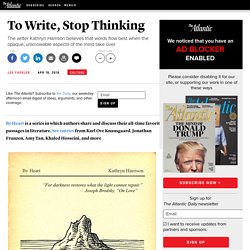
See entries from Karl Ove Knausgaard, Jonathan Franzen, Amy Tan, Khaled Hosseini, and more Kathryn Harrison, author of True Crimes: A Family Album, has some simple advice for her writing students: Please stop thinking. In our conversation for this series, she discussed a favorite Joseph Brodsky poem in which a man has a beautiful, restorative fantasy about a person he once loved—a dream that’s possible only with the lights turned off.
How stress affects your body - Sharon Horesh Bergquist. Let’s take a closer look at how the stress response works.

When your brain senses danger, your amygdala, the part of your brain that helps with emotional processing, sends an alarm signal to your hypothalamus. Acting as command central, your hypothalamus activates your sympathetic nervous system. This part of your autonomic nervous system leads to the release of adrenaline (also known as epinephrine) from your adrenal glands into your blood stream. All this happens in a split second.
After adrenaline subsides, the second phase of your stress response kicks in. There are two parts to your stress response—turning it on and turning it off. Without the latter relaxation phase of the stress response, stress can spiral into a chronic state. Stress can even take years off your life. Fortunately, you can dampen your stress response by changing how you perceive a stressful event.